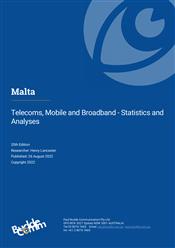Malta Telecoms Market Report
Telecoms, Mobile and Broadband - Statistics and Analyses

Malta preps for subsea cable connection to France
Malta’s small telecom sector is among the most advanced in Europe. This has been helped by the topography, which has made it relatively easy for operators to expand the reach of their fibre infrastructure. With high mobile and broadband penetration rates, the government and regulator have effective strategies in place to capitalise on these infrastructure developments to ensure that the population has among the fastest data rates in Europe, and so is well positioned to take advantage of emerging e-commerce opportunities.
The sector has also been stimulated by regulatory measures designed to reduce consumer prices. Melita having been sold to EQT in late 2019 and Vodafone Malta having been sold to Monaco Telecom, and rebranded as Epic. The incumbent telco GO is investing in a subsea cable to connect the islands to France and Egypt. Expected to be ready for service in 2022, the cable will further enhance Malta’s internet bandwidth and lead to reduced prices for end-users.
There has also been some encouragement to increase market competition. This led to the VULA agreement between GO and Epic Malta, by which Epic was able to enter the fixed broadband market using GO’s fibre infrastructure. In April 2021 Epic began offering FttP services directly, over its own fibre network
Melita provides a national gigabit service via its fibre and DOCSIS3.1 networks, while GO’s extensive FttP network covered about 150,000 premises by early 2021. The company is investing €100 million to develop LTE and fibre through to 2023.
Key developments:
- Vodafone Malta rebrands as Epic Malta, begins rolling out its own FttP infrastructure, contracts Ericsson as sole 5G vendor;
- Monaco Telecom sells its tower portfolio in Malta to Phoenix Tower International (PTI);
- Melita launches 5G-ready network, completes project to deliver fibre networks to public schools, provides a 1Gb/s broadband service nationally;
- GO commits to €100 million five-year investment in fibre infrastructure, invests €24 million in submarine cable system linking to Marseille and Egypt;
- Regulator assesses interest in 3.5Gz spectrum for 5G services;
- Government supporting a national FttP network;
- Report update includes the regulator's market data updates to December 2021, telcos' operating data to Q4 2021, updated Telecom Maturity Index charts and analyses, recent market developments.
Companies mentioned in this report:
Epic Malta (Vodafone Malta), GO, Melita, SIS, Ozone, Redtouch Fone, PING, Monaco Telecom, Divitel
Related Reports
- Europe - Mobile Network Operators and MVNOs
- Spain - Telecoms, Mobile and Broadband - Statistics and Analyses
- Denmark - Telecoms, Mobile and Broadband - Statistics and Analyses
- Russia - Telecoms, Mobile and Broadband - Statistics and Analyses
- Croatia - Telecoms, Mobile and Broadband - Statistics and Analyses
- Cyprus - Telecoms, Mobile and Broadband - Statistics and Analyses
- Belarus - Telecoms, Mobile and Broadband - Statistics and Analyses
- Netherlands - Telecoms, Mobile and Broadband - Statistics and Analyses
- Estonia - Telecoms, Mobile and Broadband - Statistics and Analyses
Share this Report
TMT Intelligence
A platform to scale your intelligence tasks
Monitor critical insights with our AI-powered Market Intelligence Platform gathering and analyzing intelligence in real time. With AI trained to spot emerging trends and detect new strategic opportunities, our clients use TMT Intelligence to accelerate their growth.
If you want to know more about it, please see:
Research Methodology
BuddeComm's strategic business reports contain a combination of both primary and secondary research statistics, analyses written by our senior analysts supported by a network of experts, industry contacts and researchers from around the world as well as our own scenario forecasts.
For more details, please see:
More than 4,000 customers from 140 countries utilise BuddeComm Research
Are you interested in BuddeComm's Custom Research Service?
Hot Topics
News & Views
Have the latest telecommunications industry news delivered to your inbox by subscribing to BuddeComm's weekly newsletter.